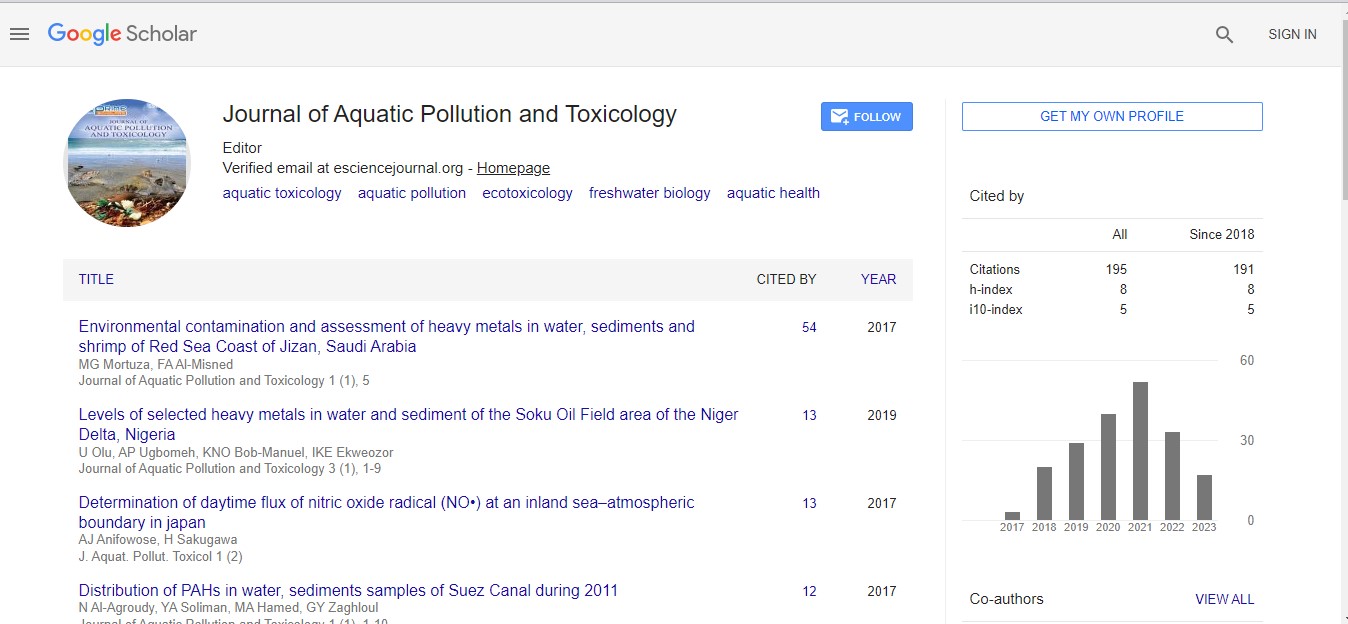Short Communication - (2024) Volume 8, Issue 2
Unveiling the Intricacies of Toxicology: Understanding the Science of Poisons
Hiroshi Yamamoto*
Department of Aquatic Science, Osaka University, Japan
*Correspondence:
Hiroshi Yamamoto,
Department of Aquatic Science, Osaka University,
Japan,
Email:
Received: 29-May-2024, Manuscript No. IPJAPT-24-20014 ;
Editor assigned: 31-May-2024, Pre QC No. IPJAPT-24-20014 (PQ);
Reviewed: 14-Jun-2024, QC No. IPJAPT-24-20014 ;
Revised: 19-Jun-2024, Manuscript No. IPJAPT-24-20014 (R);
Published:
26-Jun-2024, DOI: 10.21767/2581-804X-8.2.12
Introduction
Toxicology is a field of science dedicated to the study of
poisons and their effects on living organisms. It delves into the
intricate interactions between toxic substances and biological
systems, aiming to comprehend their mechanisms of action,
toxicity levels, and potential risks to human health and the
environment. With its broad scope encompassing everything
from environmental pollutants to pharmaceutical drugs,
toxicology plays a pivotal role in safeguarding public health and
guiding regulatory decisions. At its core, toxicology examines
the adverse effects of chemicals on living organisms, ranging
from individual cells to entire ecosystems. Through rigorous
experimentation and analysis, toxicologists seek to identify and
quantify the potential hazards posed by various substances. This
involves studying their absorption, distribution, metabolism,
and excretion within the body, as well as the specific cellular
and molecular mechanisms underlying their toxicity. One of
the fundamental concepts in toxicology is the dose-response
relationship, which elucidates how the magnitude of a toxic
effect correlates with the dose or concentration of the toxic
substance. Understanding this relationship is crucial for
assessing the potential risks associated with exposure to a
particular chemical.
Description
Toxicologists utilize various experimental models, including
animal studies, cell cultures, and computational simulations, to
elucidate dose-response relationships and extrapolate findings
to human populations. Toxicity assessment encompasses a
spectrum of endpoints, ranging from acute effects, which occur
shortly after exposure, to chronic effects, which manifest over
prolonged periods. Acute toxicity studies aim to determine
the lethal dose (LD50) or concentration (LC50) of a substance,
providing insights into its potential to cause immediate harm.
Chronic toxicity studies, on the other hand, evaluate the
long-term effects of repeated or continuous exposure, such
as carcinogenicity, reproductive toxicity, and neurotoxicity. In
addition to assessing toxicity, toxicologists evaluate the risks
associated with exposure to chemicals in various contexts,
including occupational settings, consumer products, and
environmental contaminants. Risk assessment involves
integrating toxicological data with exposure information
to estimate the likelihood of adverse effects occurring
in exposed populations. This process informs regulatory
agencies and policymakers in establishing safety guidelines,
setting permissible exposure limits, and implementing risk
management strategies to protect human health and the
environment. Toxicology also intersects with other disciplines,
such as pharmacology, environmental science, and forensic
science, contributing to diverse applications beyond traditional
toxicity testing. For instance, pharmacotoxicology focuses
on evaluating the safety and efficacy of pharmaceutical
drugs, helping to identify potential side effects and optimize
therapeutic regimens. [1-4].
Conclusion
Environmental toxicology investigates the impacts of pollutants
on ecosystems and wildlife, informing conservation efforts
and environmental policy decisions. In conclusion, toxicology
serves as a cornerstone of modern science, providing
invaluable insights into the risks posed by toxic substances and
guiding efforts to mitigate their adverse effects. By unravelling
the complexities of poisons and their interactions with living
organisms, toxicologists play a vital role in safeguarding human
health and environmental sustainability. As our understanding
of toxicology continues to evolve, so too does our ability to
address emerging challenges and protect the well-being of present and future generations. Toxicology is the study of
adverse effects of chemicals on living organisms. It examines
toxins’ properties, mechanisms of action, and their impact on
biological systems. Toxicologists assess risks to humans and
ecosystems, often through testing and analyzing substances
for safety.
Acknowledgement
None.
Conflict Of Interest
The author declares there is no conflict of interest in publishing
this article.
References
- Kishida T (2021) Olfaction of aquatic amniotes. Cell Tissue Res 383(1):353-365.
[Crossref] [Google Scholar] [PubMed]
- Gamage NT G, Miyashita R, Takahashi K, Asakawa S, Senevirathna JDM, et al. (2022) Proteomic applications in aquatic environment studies. Proteomes 10(3):32.
[Crossref] [Google Scholar] [PubMed]
- Ke F, Zhang QY (2019) Aquatic animal viruses mediated immune evasion in their host. Fish Shellfish Immunol 86:1096-1105.
[Crossref] [Google Scholar] [PubMed]
- Davidovich N, Morick D, Carella F (2020) Mycobacteriosis in aquatic invertebrates: A review of its emergence. Microorganisms 8(8):1249.
[Crossref] [Google Scholar] [PubMed]
Citation: Yamamoto H (2024) Unveiling the Intricacies of Toxicology: Understanding the Science of Poisons. J Aquat Pollut Toxicol. 8:12.
Copyright: © 2024 Yamamoto H. This is an open-access article distributed under the terms of the Creative Commons Attribution License, which permits unrestricted use, distribution, and reproduction in any medium, provided the original author and source are credited.

